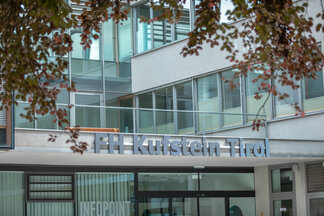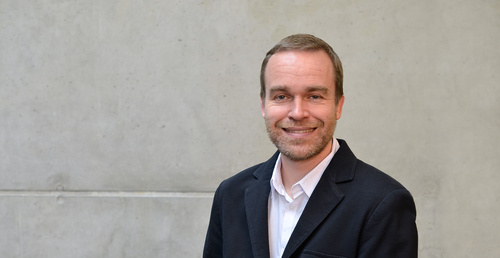Do you have a talent for marketing and communication? Then our full-time bachelor's program is ideal for you. In this practice-driven and forward-thinking program, you'll learn to leverage the digital world and AI to create successful campaigns.

Marketing & Communication Management
Bachelor's degree program
Overview
-
Qualification Level:
Stufe 1, Bachelor -
Price:
Euro 363,36* (excl. Student Union-fees) each semester -
Academic Degree:
Bachelor of Arts in Business (BA) -
Academic Program:
Full-time -
Language:
80% German, 20% English -
Remote Options:
E-Learning min. 15 % online -
Exchange Semester:
Organized stay abroad, 5th Semester** -
Admission Requirements:
General admission requirements -
Study Places per Year:
33
Program Description



Discover our full-time Bachelor's degree in Marketing & Communication Management. Built on a solid business foundation, this program provides comprehensive training in marketing, media, and communication. You will develop the ability to think and act analytically, creatively, and innovatively.
Our Marketing & Communication Management degree program provides thorough training, building on business fundamentals and offering in-depth expertise in marketing, media, and communication. By blending theory with practice, students are equipped to think both analytically and creatively. The program emphasizes advertising psychology, brand management, content creation, and the use of generative AI. Case studies, real-world projects, a semester abroad, and an internship enhance practical knowledge and develop social skills. Graduates are ideally prepared for careers in marketing management, communications consulting, and brand management.
Study Focus
-
32 %
Practical application & social skills
-
24 %
Core competence: marketing
-
22 %
Core competence: communication
-
12 %
Economics & social science
-
10 %
Creativity & Multimedia
What You Will Learn
-
Independent marketing projects: planning, implementation, control
-
Print & Online: Strategic marketing planning & implementation
-
Classic & digital campaigns: operational implementation
-
Touchpoint optimization: focusing on customer value
-
Sound market and media analysis
-
Define and track KPIs
-
Development of national and international PR and communication strategies
-
Strategic brand development
Popular Occupational Fields
- Marketing management
- Communications management
- Brand management
- Marketing and communications consulting
- Content management
Career Opportunities
-
EUR 6.65 billion
Gross advertising expenditure in Austria in 2024; robust market (according to Statista)
-
Variety of jobs
in marketing and communication management
-
2 %
annual growth
The path to the Bachelor's Degree

In the first year, you will receive a strong foundation in marketing, communication, and media. As you progress, you will develop management techniques and explore content creation. You will apply your knowledge through practical projects, and the final Bachelor’s thesis gives you the opportunity to research a topic of your choice in depth.
Special features:
-
Semester abroad
-
Management Forum Kufstein: Live talks with entrepreneurs
-
Project collaborations with companies and guided practical projects for hands-on experience
Recognition of Prior Learning
Students have the option to receive credit for skills and competencies they have already acquired before the start of each semester.
To apply for credit, they must submit a request directly to the Director of Studies.
Director of Studies

Prof. (FH) Dr. Wolfgang Reitberger
Director of Studies Bachelor Marketing & Communication Management, Master Digital Marketing
Curriculum
international competence
Marketing & Communications (E)
- Semester 5
- 15 ECTS
During their stay abroad at the partner university, the students must complete 15 ECTS courses in the field of "Marketing & Communications" - the teaching agreements must be agreed in advance with the director of study course by means of the Learning Agreement.
DetailsElectives (E)
- Semester 5
- 10 ECTS
During their stay abroad at the partner university, the students must complete courses in the field of "Electives" to the extent of 10 ECTS - the teaching agreements must be agreed in advance with the director of study course by means of the Learning Agreement.
DetailsBusiness Studies (E)
- Semester 5
- 5 ECTS
During their stay abroad at the partner university, the students must complete courses in the field of "Business Studies" totaling 4 ECTS - the teaching agreements must be agreed in advance with the director of study course by means of the Learning Agreement.
DetailsCommunications
Media Esthetics
- Semester 2
- 3 ECTS
An important part of the course is the influence of the media on social and cultural self-understanding. The interplay of sensory perception and the formation of taste plays just as central a role as technical reproducibility and the concept of representation. The reciprocal relationship between technology and media is also reflected in the context of style and sensory perception. Specific topics such as the reciprocal influence of the esthetic, material and formal composition of media or both the design and effect of media artefacts are to be developed within the framework of the course through literature studies and practical exercises by the students.
DetailsCommunication Theory
- Semester 2
- 4 ECTS
The comprehensive field of communication is tackled in the course Communication Theory and prepared as a foundation for further studies. In addition to definitions of terms, the following are also used in particular •Communication models (e.g. stimulus response, Maletzke, Lasswell formula, communication square, etc.) •Communication theories (e.g. agenda setting, gatekeeper, news factors, spiral of silence, etc.) •The book deals with the effects of communication and the ways of thinking of Luhmann, Habermas and Watzlawick. The theoretical preparation and subsequent exercises ensure an understanding of communication in practice.
DetailsMedia Theory
- Semester 2
- 3 ECTS
In the introductory course in the field of media, the areas of history, development and mode of action are addressed above all, and, building on the standard works of media theory, both individual and mass media are dealt with. The topics are presented through central positions of relevant media theorists - this circumstance promotes the students’ independent academic approach with the aim of understanding various media theories, critically reflecting on media developments and being able to apply the results in practice in both corporate communication and marketing. The following categories are the main teaching contents: •Media history and definitions •Significance of technology-based media (new/digital media) •Media theories according to Marschall McLuhan, Lev Manovich, Niklas Luhmann
DetailsCorporate Communications & PR
- Semester 3
- 6 ECTS
In this course the students get an overview of the different disciplines of corporate communication. In particular, the new challenges facing traditional organizational structures through digital channels are addressed. Based on this, they learn to develop strategic communication processes and to present them analytically in a communication concept.
DetailsMedia Competence
- Semester 4
- 3 ECTS
The contents learned in the VO will be deepened in a field trip. After working out various topics relevant to the field trip, they move from the lecture hall directly into the action. Depending on the location, visits to companies, media or other communication centers are planned.
DetailsMedia Competence
- Semester 4
- 2 ECTS
The students get to know and discuss current questions of media ethics. They critically reflect on their use of media, question structures and develop possible solutions. The students learn about the special features of the Austrian media landscape and the significance of the Austrian media in an international comparison. They recognize media quality and know about the influence and special features of Austrian media policy.
DetailsCreativity & Innovation
Content Creation 1
- Semester 2
- 4 ECTS
After the Content Creation exercise, students will be able to - Demonstrate and apply content creation principles - Analyze content - Develop content
DetailsContent Creation(E)
- Semester 2
- 2 ECTS
The Content Creation lecture takes up basic terms, theories and concepts of content creation, which are further explored in the exercise. Students learn the basic concepts of content marketing (e.g. graphic and visual design, photo, video) for relevant channels.
DetailsContent Creation 2
- Semester 3
- 4 ECTS
After the Content Creation 2 exercise, students will be able to - Consider user experience when creating content - Develop convincing content for different target groups.
DetailsMarketing
Strategic Marketing & Marketing Planning
- Semester 1
- 3 ECTS
The lecture on the fundamentals of marketing concentrates on preparing students for the advanced modules in their studies: Students acquire in-depth knowledge of the entire range of strategic operative marketing instruments and know about their possible applications in marketing practice. In addition, on the one hand marketing theories are taught (technical authority), and, on the other hand by the inclusion of strategic marketing over the conceptional-strategic aspect a fundamental understanding for business thinking is also created.
DetailsAdvertising Psychology (E)
- Semester 1
- 4 ECTS
The course Advertising Psychology focuses on aspects of consumer psychology that form the basis for understanding consumer behavior. The focus here is on theories of consumer behavior that originate, for example, from the areas of activating processes (emotion, motivation, attitude), cognitive processes (reception, processing, and storage of information), or decision behavior as an interaction. During the course, methods for researching market experience and behavior are presented and a cornerstone is laid for understanding the effects of communication measures. Students are familiarized with important terms such as motivation, image, emotion, cognition or activation within the framework of this course and develop various theoretical approaches (e.g. perception, emotion, learning or attitude theory) on the basis of concrete tasks. This provides a basis for the analysis of the practical implementation (e.g. color and shape effect in print advertising). In this way, students are prepared to understand consumer behavior, to recognize connections between communication, marketing and consumer behavior, and to apply and implement these findings in practice.
DetailsStrategic Marketing & Marketing Planning
- Semester 1
- 4 ECTS
The course Strategic Marketing and Marketing Planning takes up basic concepts, theories and concepts in online phases, which are further developed in the class-room phases. The students learn to understand the basic concepts of marketing such as needs, desires, demand, benefit promises and through the inclusion of the STM Models (Segmentation, Targeting & Positioning Model) the marketing management process becomes an understandable cycle. For an optimal basis, the marketing mix and the customer journey are also used as central instruments. Once the fundamentals have been worked out, the position of marketing in strategic planning is examined in more detail. Strategies for successful positioning, growth potential or implementation of market positioning, for example, are incorporated into the overall concept and the necessary tools such as SWOT analysis, portfolio or Ansoff matrix are used.
DetailsBranding & Positioning(E)
- Semester 3
- 4 ECTS
The course provides an introduction and background to strategic brand management from a marketing and business perspective. Fundamental concepts such as brand development, brand building, brand management, the developments of a brand value are discussed theoretically and on the basis of case studies. The importance of differentiation for the brand and the subsequent brand management is also discussed. Through practical examples, the students learn how brands are built and designed.
DetailsOnline Marketing(E)
- Semester 4
- 4 ECTS
Online marketing measures are presented. From search engine marketing and e-mail marketing to marketing on one’s own and other websites. Special features of these forms of marketing are addressed as well as target group approach, costs and impact measurement.
DetailsProduct Development & Service Design
- Semester 4
- 4 ECTS
In this course, students become familiar with the principles and practices in product development, design, marketing and the introduction of new products and services. Students learn how to integrate (end) customers into this process, which concepts and tools can be used to support successful product development, which role the product life cycle plays and which marketing strategies can be applied in the individual phases of the product life cycle.
DetailsAdvertising & Media Planning
- Semester 4
- 3 ECTS
The course Advertising and Media Planning as ILV deals in detail with the different "Above the line" and "Below the line" media and communication channels. Both classical media (e.g. print, TV, radio, out-of-home) and new media (e.g. Internet, social media) are processed on the basis of different points of view: (Origin) history, field of application, advertising effect, usage criteria, Media usage behavior, as well as advantages and disadvantages from different user perspectives. The competitive environment and costs are examined in detail so that the results can then be used efficiently and effectively in media planning. A thematic focus is the media of classical advertising. After the students have become familiar with the most important key figures of the media market (e.g. circulation, reach, average contacts (OTS), media weighting (GRP)), media planning is treated as a practical counterpart to theoretical preparation using appropriate examples.
DetailsMarketingmanagement & Controlling(E)
- Semester 2
- 3 ECTS
In order to impart in-depth marketing knowledge, students are taught the principle of market-oriented business management. Marketing as a management task has to cover different areas - planning, controlling, monitoring and coordination define only some of the important aspects in the area of marketing management. Marketing controlling takes on the task of questioning the effectiveness and efficiency of this already mentioned market-oriented business management. The main issue here is whether the formulated goals will be achieved or whether the selected measures represent the optimal way of achieving them. In order to measure the achievement of objectives, students are given an overview of possible KPIs in various areas of the company and can apply situation-relevant KPIs. The stu-dents should be able to ask these questions, answer them and respond to the respective results. The product management system is also addressed as a snap-shot and the associated company-internal processes are dealt with.
DetailsOmnichannel Marketing Communications(E)
- Semester 4
- 4 ECTS
Based on the contents of the previous semesters, which dealt with both classical and new media and communication channels of internal and external corporate communication and the underlying marketing strategies, in this course the students learn the integrative combination of the different communication measures (thus also the interweaving of monological and dialogical) in theory and through case studies. Whereas the focus in the course Advertising and Media Planning was on classical media, the more complex dialogical media are in the foreground here.
DetailsPractice transfer & empiricism
Market Research
- Semester 2
- 3 ECTS
The lecture on market research deals with the reappraisal of one’ s own basic principles and approaches, while the exercise focuses on practical application. In addition to the definition of market research, fundamental areas such as tasks, areas of application and significance are theoretically prepared. Subsequently, the comprehensive research process is dealt with in its individual aspects theoretically and on the basis of a research problem: Problem definition; research design; planning and implementation (pilot studies, pre-tests, sampling, briefings); data collection; data entry and cleansing; evaluation; interpretation; final report.
DetailsScientific Work
- Semester 2
- 3 ECTS
In the course on research, the main aim is to familiarize students with the special features, rules and principles of academic and research work. Students are prepared to write seminar papers independently and at an academic level. This preparation includes a focus on dealing with literature as well as discussions about the quality of academic research - especially the concepts of intellectual honesty and intersubjective comprehensibility. Supplementary teaching content may include topics such as types of literature, types of use and citation, as well as definitions of terms, theses and hypotheses, and the derivation and limitation of topics.
DetailsMarket Research
- Semester 2
- 2 ECTS
The lecture on market research deals with the reappraisal of one’ s own basic principles and approaches, while the exercise focuses on practical application. In addition to the definition of market research, fundamental areas such as tasks, areas of application and significance are theoretically prepared. Subsequently, the compre-hensive research process is dealt with in its individual aspects theoretically and on the basis of a research problem: Problem definition, research design, planning and implementation (pilot studies, pre-tests, sampling, briefings), data collection, data entry and cleansing, evaluation, interpretation and final report.
DetailsMarketing Consolidation
- Semester 3
- 5 ECTS
Drawing on the fundamentals of strategic marketing planning, students gain knowledge for the efficient and effective handling of marketing problems. This is done by selecting a course of various specializations and includes, among other things, the organization, implementation and reflection of academic and application-oriented, comprehensive tasks in the field of marketing.
DetailsInternship
- Semester 6
- 20 ECTS
• Supplementing the theoretical knowledge of the students with practical activities and questions of commercial law in practice. • At least 500 working hours at an external company with full employment. • The internship ensures that the students are able to find their way around when they start their professional life and gain confidence in the implementation of their acquired knowledge through the experience they have already gained. • Processes, workflows and situations in the professional environment should be learned and understood. • Support of the students during their internship: Reflection, discussion of problems and success stories.
DetailsBachelor Thesis Seminar
- Semester 6
- 10 ECTS
Within a given period of time, the students should academically research a question relevant to their studies and education within the framework of a Bachelor thesis. Using academic methods, the topic is to be worked on and discussed independently - this takes place in an interdisciplinary context and in the form of a theoretical examination of an academic question. The Bachelor thesis can be written with a practical reference from the internship and thus academically and practically deal with a current and tangible problem.
Detailssocial skills
Teambuilding
- Semester 1
- 1 ECTS
Under the supervision of the lecturers, the students are to be integrated as a group into the new context of a university and the associated new environment in order to consolidate both their entry and their cooperation from the outset. This is mainly substantiated by the fact that students receive a theoretical introduction to the theories of team building and communicative action. The students thereby acquire the ability to better understand interpersonal communication processes, to make expectations and conditions transparent and conscious in the new context and to work more efficiently.
DetailsProject Management
- Semester 1
- 2 ECTS
After the basic definition of the project management functions in the context of a marketing and communication project, the students are introduced to their practical use. In particular, the tasks of the project manager and the most important project management tools and methods are discussed. The course content includes the project concept and project types as well as performance planning, resource and cost planning, project organization, IT-supported project documentation and the concluding project manual.
DetailsPresentation Techniques
- Semester 1
- 2 ECTS
After a short theoretical introduction, case studies and exercises are used to familiarize students with oral and media-supported communication. Particular attention is paid to the preparation of content (structure and outline) and the execution of presentations (preparation, targeted use of media).
DetailsForeign Language I
- Semester 1
- 6 ECTS
The language modules integrated into the degree program curriculum are designed according to the methodological principles of a communicative, action-oriented approach. The competence levels of the modules are based on the Common European Framework of Reference for Languages (CEFR), and a central objective is that students increase their communication skills by at least one level. In addition, there is a clear focus on acquiring academic and business-oriented skills in the target language. - A1-A2 Basic communication skills - B1-B2 Advanced use of the language and communication skills - B2-C1 Independent language use to expert communication skills - C1-C2 Expert language skills to fluent, competent communication skills
DetailsForeign language II
- Semester 2
- 6 ECTS
The language modules integrated into the degree program curriculum are designed according to the methodological principles of a communicative, action-oriented approach. The competence levels of the modules are based on the Common European Framework of Reference for Languages (CEFR), and a central objective is that students increase their communication skills by at least one level. In addition, there is a clear focus on acquiring academic and business-oriented skills in the target language. - A1-A2 Basic communication skills - B1-B2 Advanced use of the language and communication skills - B2-C1 Independent language use to expert communication skills - C1-C2 Expert language skills to fluent, competent communication skills
DetailsPractical Project 1
- Semester 3
- 4 ECTS
To prepare the students optimally for problems in working life, practical tasks are worked on in groups, or field experiences are obtained under the guidance of the course instructors. The students contribute their acquired knowledge and compare it with observations and experiences in the context of the integrative case studies. Based on a client briefing (by the course instructor or external partners such as associations and companies), the students work on the presented projects independently, only guided by the course instructor if necessary: Planning, coordination, budgeting, control, evaluation and final reporting are in the hands of the students.
DetailsPractical Project 2
- Semester 4
- 4 ECTS
To prepare the students optimally for problems in working life, practical tasks are worked on in groups, or field experiences are obtained under the guidance of the course instructors. The students contribute their acquired knowledge and compare it with observations and experiences in the context of the integrative case studies. Based on a client briefing (by the course instructor or external partners such as associations and companies), the students work on the presented projects independently, only guided by the course instructor if necessary: Planning, coordination, budgeting, control, evaluation and final reporting are in the hands of the students.
DetailsBusiness and Management
Introduction to BWL
- Semester 1
- 2 ECTS
•Overview and context analysis of the most important subareas in business administration •Subject and principles of business administration: •Operational functional areas - Business decision theory - Fundamentals of Management and Ethics - Fundamentals of Human Resources and Organization - Marketing Fundamentals •Fundamentals of: - Constitutive company decisions such as legal forms, location decisions, types of mergers and acquisitions and choice of business segment - Functional company decisions: Materials management, production management, marketing • Fundamentals of business value creation processes and functions (value creation architecture and structure). • Fundamentals of market-oriented, process-oriented and strategy-oriented management
DetailsIntroduction to VWL
- Semester 1
- 2 ECTS
Core topics: • Economic thinking and marginal analysis • Efficient allocation of scarce resources • The market model and market equilibrium • Macroeconomic variables (GDP, inflation, and unemployment) and their interrelationships Selected macroeconomics issues: • Elasticity and welfare • Cost functions and optimal corporate production • Price setting and market structures • Short-term macroeconomic fluctuations: The business cycle • Money, the ECB, and inflation • Long-term economic growth • International relations and trade
DetailsIntroduction to Accounting and Finance
- Semester 1
- 4 ECTS
External accounting: • Structure of the accounting system • Fundamentals of operational accounting: Tasks, sub-areas and basic concepts • Commercial accounting system: From inventory to opening balance sheet • Double-entry accounting system: Posting business cases to inventory and profit and loss accounts • Organization of bookkeeping (chart of accounts, sales tax, etc.) • Principle of period purity and accruals and deferrals Internal accounting: • Objectives and basic concepts of cost and revenue accounting • Fundamentals of cost and revenue accounting: Tasks, components and subareas • Structure of cost accounting (cost elements, cost centers, cost objects) • Contribution margin accounting
DetailsStrategic Management(E)
- Semester 1
- 4 ECTS
This course combines management models, and strategic and innovation management. By linking these subject areas, students are prepared to analyze, discuss and reflect on organizations from the perspective of business administration. Central questions such as the definition of long-term goals, the selection of business areas or measures for survival in competition are to be jointly developed and discussed on the basis of detailed basic knowledge. In addition, the topics strategic fields, market & competition, organization and creativity/innovation and the development of business models are taught.
DetailsIntroduction to Law
- Semester 3
- 3 ECTS
The introductory lecture from the legal field imparts knowledge of the Austrian legal system to the students. Basic knowledge that is relevant for business economists is taught in a manner adapted to the course of study and implemented in a practical way. Above all, sub-areas of private, corporate and company law are worked on. Constitution and principles, organs, functions, system of legal protection, liability provisions and contract law are only some of the terms defined, explained and discussed in the course. Students also gain an initial insight into the areas of commercial, corporate and competition law. The curriculum should also enable students to learn about relevant areas of law for the integrative case studies within the framework of this course - these include individual areas from the areas of copyright and event law and selected areas of commercial and corporate law. In order to provide students with in-depth and relevant legal knowledge, special areas of law for marketing specialists are selected. Examples of the individual areas would be: • Internet law • Copyright • Trademark law (intellectual property law) • Event law (including public law framework regulations)
DetailsManagement Techniques
- Semester 4
- 3 ECTS
In this course the contents of the courses of the module are linked with each other. The networking of these subject areas by didactically meaningful methods should illuminate the complexity and complexity of management from a functional perspective and prepare the students for the fact that the assumption of management tasks has more than only structural aspects on the one hand or social aspects on the other hand.
DetailsStudy regulations to download
-
Marketing & Communications Management
in effect since October 12, 2022, start of study program from academic year 2023/24
- All study regulations
Frequently Asked Questions
Can I work while studying?
Classroom teaching usually occurs from Monday to Friday, occasionally on Saturdays in blocked units. With a significant amount of self-study, students can manage their schedules independently and have the flexibility to work part-time in the industry.
Where can I spend the semester abroad?
We have over 225 partner universities worldwide from which our students can choose. Some partner universities are particularly suitable for students from this degree program, as they offer further content and thus allow students to deepen their skills even further.











